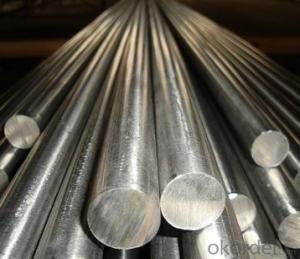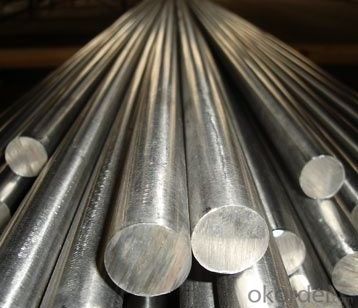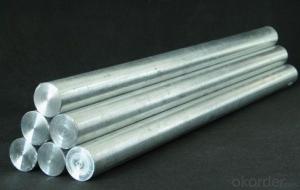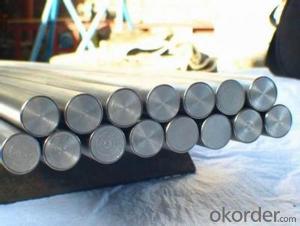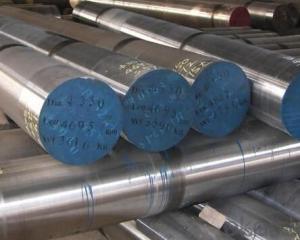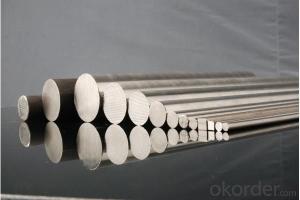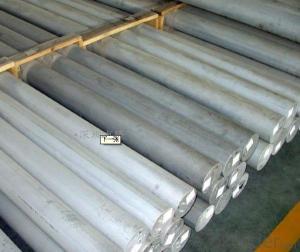Special Steel 430 Stainless Steel Round Bar
- Loading Port:
- China main port
- Payment Terms:
- TT OR LC
- Min Order Qty:
- 30 m.t.
- Supply Capability:
- 10000 m.t./month
OKorder Service Pledge
OKorder Financial Service
You Might Also Like
Specification
Product information:
Standard | ASTM | ||||||||||
Grade | astm 430 | ||||||||||
MOQ | 1 Metric Ton | ||||||||||
Diameter | 8mm~1500mm | ||||||||||
Length | 6m,12m or as required. | ||||||||||
Diameter Tolerance | As required | ||||||||||
Condition of delivery | Hot rolled,Cold Rolled or as required. | ||||||||||
Chemical Composition(%) | |||||||||||
C | Si | Mn | P | S | Cr | ||||||
≤0.12 | ≤1.00 | ≤1.00 | ≤0.04 | ≤0.03 | 16.00-18.00
| ||||||
Ni | |||||||||||
≤0.75 | |||||||||||
Mechanical Properties(In Quenching and Tempering) | |||||||||||
Tensile strength | Yield strength | Elongation | Reduction in Area | Impact | Hardness | ||||||
(σb/MPa) | (σs/MPa) | (δ5/%) | (ψ/%) | (J) | (HB) | ||||||
≥205 | ≥450 | ≥22 | ≥50 | - | ≤183 | ||||||
Product Show:
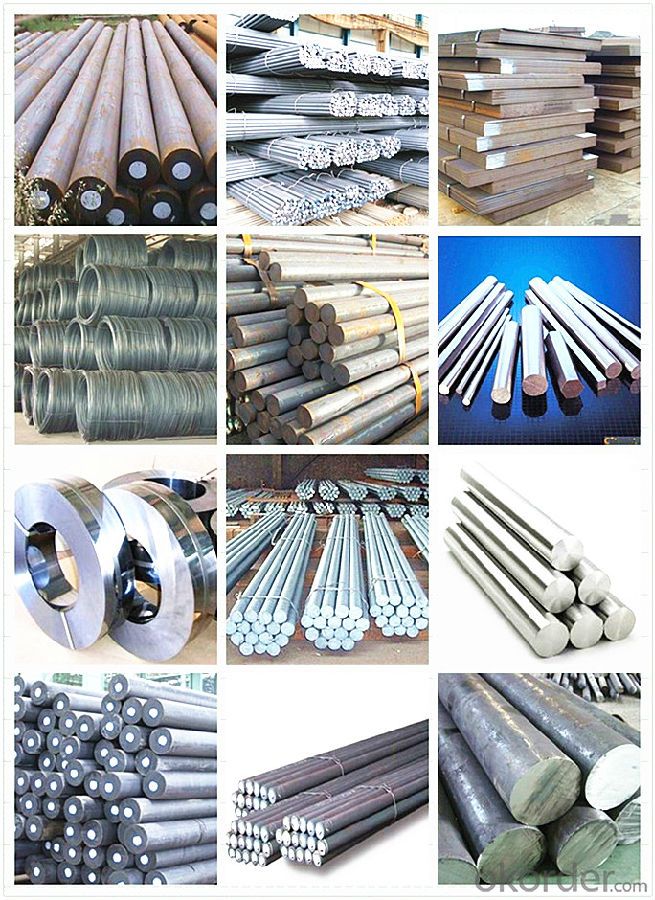
Workshop Show:
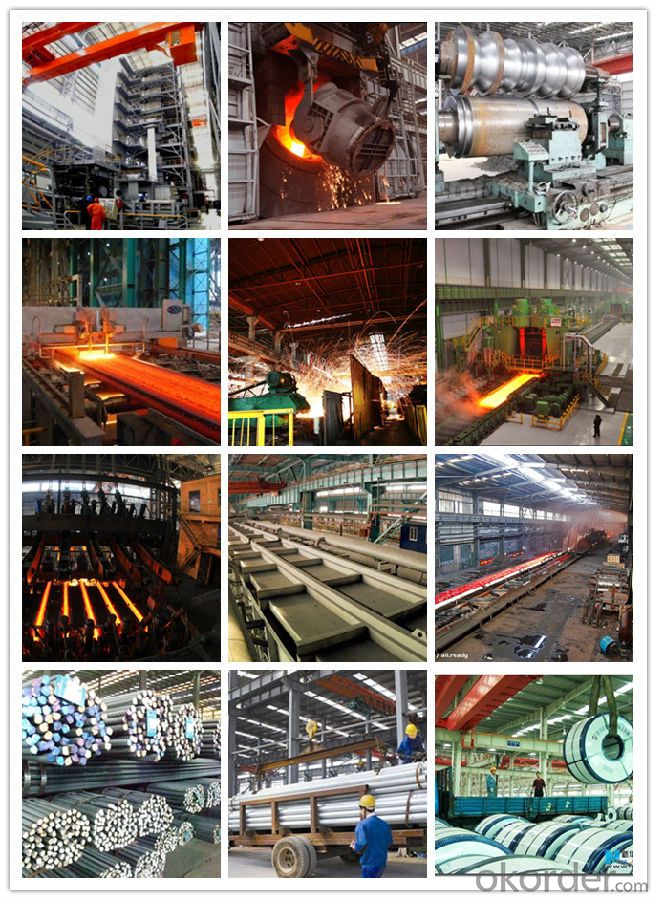
Shipping
1. FedEx/DHL/UPS/TNT for samples, Door-to-Door;
2. By Air or by Sea for batch goods, for FCL; Airport/ Port receiving;
3. Customers specifying freight forwarders or negotiable shipping methods!
Delivery Time: 3-7 days for samples; 5-25 days for batch goods.
Payment Terms
1.Payment: T/T, L/C, Western Union, MoneyGram,PayPal; 30% deposits; 70% balance before delivery.
2.MOQ: 1pcs
3.Warranty : 3 years
4.Package Informations: 1) EXPORT, In 20 feet (GW 25 ton) or 40 feet Container (GW 25 ton)
2)as customer's requirement
Why choose us?
(1) The leading exporter in China special steel industry.
(2) Large stocks for various sizes, fast delivery date.
(3) Good business relationship with China famous factories.
(4) More than 7 years steel exporting experience.
(5) Good after-sales service guarantee.
- Q: How does the availability of raw materials affect the production of special steel?
- The production of special steel heavily relies on the accessibility of raw materials. Special steel, renowned for its outstanding strength, durability, and corrosion resistance, is widely used in industries like automotive, aerospace, and energy. The availability of raw materials, including iron ore, coal, chromium, nickel, and molybdenum, directly affects the production of special steel. These materials are crucial for the composition and characteristics of the steel. Any disruptions in their supply can significantly impact the production process. If the availability of iron ore, which is the primary source of iron, becomes limited or expensive, it can result in a scarcity of the main ingredient for steel production. Consequently, the production of special steel may decrease, leading to higher prices and potential shortages in the market. Similarly, the availability and cost of alloying elements play a vital role. These elements enhance the properties of steel, making it suitable for specific applications. For instance, chromium improves corrosion resistance, while molybdenum enhances strength at high temperatures. If these alloying elements are not readily available, it may hinder the ability to produce special steel with the desired properties. Moreover, the availability of energy resources like coal or natural gas is crucial for special steel production. These resources are used in the steelmaking process, particularly in the production of coke, which is essential for smelting iron ore. Limited availability or increased prices of energy resources can impact the cost and efficiency of steel production. In conclusion, the availability of raw materials plays a vital role in the production of special steel. Any disruptions or limitations in the supply of raw materials, including iron ore, alloying elements, and energy resources, can have a significant impact on the production process. This can result in higher prices, potential shortages, and compromised properties of the final product. Thus, ensuring a stable and sufficient supply of raw materials is crucial for the production of high-quality special steel.
- Q: Can special steel be used for manufacturing tools?
- Yes, special steel can be used for manufacturing tools. Special steel is often preferred for tool production as it offers superior strength, durability, and resistance to wear and tear. It also allows for the creation of tools with specific properties, such as high heat resistance or corrosion resistance, making it suitable for various applications in industries like automotive, aerospace, and construction.
- Q: Is special steel magnetic?
- Yes, special steel can be magnetic depending on its composition and treatment. Certain types of special steel, such as ferritic and martensitic stainless steels, are magnetic, while others like austenitic stainless steels are generally non-magnetic.
- Q: How does special steel contribute to the automotive racing aftermarket industry?
- Special steel plays a crucial role in the automotive racing aftermarket industry by providing high-performance components that enhance the overall performance and durability of race cars. These components, such as crankshafts, connecting rods, and valve springs, are often subject to extreme conditions and require exceptional strength, heat resistance, and fatigue resistance. Special steel alloys, with their superior mechanical properties, allow for the production of lightweight yet robust parts that can withstand the demanding requirements of racing. This contributes to improved engine efficiency, increased power output, and enhanced reliability, ultimately giving racing enthusiasts a competitive edge on the track.
- Q: How does special steel withstand high-velocity impacts?
- Special steel is able to withstand high-velocity impacts due to its unique properties and composition. One key factor is its high strength and hardness, which allows it to resist deformation and fracture under extreme forces. Special steel also often contains alloying elements such as chromium, molybdenum, nickel, and vanadium, which contribute to its exceptional toughness and impact resistance. Furthermore, special steel is often heat-treated to enhance its mechanical properties. Through processes such as quenching and tempering, the steel's microstructure is altered, resulting in a fine-grained structure with improved strength and hardness. This heat treatment also enhances the steel's ability to absorb and dissipate energy during high-velocity impacts, reducing the risk of failure. Moreover, special steel is often designed with specific alloys and compositions to enhance its performance in particular applications. For example, some grades of steel are specifically engineered for armor applications, where they must withstand high-velocity impacts from projectiles. These steels may have additional elements such as boron or titanium, which further enhance their ability to resist penetration and deformation under extreme loads. In summary, special steel's ability to withstand high-velocity impacts is attributed to its high strength, hardness, toughness, and impact resistance. Its unique composition, heat treatment processes, and targeted design make it a reliable choice for applications where impact resistance is crucial.
- Q: How does special steel contribute to sustainability efforts?
- Special steel contributes to sustainability efforts in several ways. Firstly, it has a longer lifespan compared to regular steel, which reduces the need for frequent replacements and minimizes waste. Additionally, special steel is often made from recycled materials, reducing the demand for raw resources and decreasing the environmental impact of mining and extraction. Furthermore, its exceptional strength and durability allow for the construction of more energy-efficient buildings and infrastructure, reducing energy consumption and greenhouse gas emissions. Overall, special steel plays a vital role in promoting a more sustainable and eco-friendly approach in various industries.
- Q: What are the different methods of surface coating for special steel?
- There are several methods of surface coating for special steel. Some common methods include electroplating, hot-dip galvanizing, powder coating, and thermal spraying. Each method offers unique benefits and is chosen based on the specific requirements of the steel application. Electroplating involves depositing a layer of metal onto the steel surface through an electrolytic process. Hot-dip galvanizing involves immersing the steel in a molten zinc bath to form a protective coating. Powder coating involves applying a dry powder onto the steel surface which is then cured to create a durable finish. Thermal spraying involves spraying a molten or powdered material onto the steel surface to create a protective coating.
- Q: What are the specific requirements for special steel used in the defense sector?
- Due to the critical nature of its applications, the defense sector imposes highly demanding requirements on special steel. These requirements encompass: 1. Exceptional strength and durability: Special steel utilized in the defense sector must possess outstanding strength and durability to withstand extreme conditions and endure wear and tear. It should have the capacity to endure high levels of stress, impact, and pressure. 2. Superior corrosion resistance: Defense equipment frequently operates in harsh environments and is exposed to elements that can cause corrosion. Consequently, special steel employed in the defense sector must display excellent corrosion resistance properties to ensure the equipment's longevity and reliability. 3. Heat resistance: Defense applications often involve exposure to high temperatures, such as in jet engines or armored vehicle components. Special steel used in these sectors must retain its strength and structural integrity even at elevated temperatures. 4. Machinability and weldability: Special steel employed in the defense sector should possess favorable machinability and weldability characteristics to facilitate manufacturing and assembly processes. This allows for ease of fabrication, repair, and maintenance of defense equipment. 5. Hardness and toughness: Defense applications necessitate a combination of hardness and toughness in special steel. It must resist penetration and deformation while simultaneously being able to absorb energy and resist fracture. 6. Non-magnetic properties: In specific defense applications, such as submarines and magnetic resonance imaging (MRI) equipment, non-magnetic properties are essential. Special steel employed in these sectors must possess low magnetic permeability to prevent interference with sensitive electronic systems. 7. Certification and compliance: Special steel used in the defense sector must meet specific certification and compliance standards, such as those established by defense organizations or international quality management systems like ISO 9001. These standards guarantee the quality, traceability, and reliability of the steel. Meeting these specific requirements for special steel utilized in the defense sector is crucial to ensure the safety, effectiveness, and longevity of defense equipment and systems. Rigorous testing and quality control processes are implemented to ensure that the steel meets the required specifications and standards.
- Q: How is the quality of special steel ensured?
- The quality of special steel is ensured through a combination of rigorous testing, strict quality control measures, and adherence to international standards and specifications. Special steel producers employ various methods such as chemical analysis, mechanical testing, and non-destructive testing to verify the composition, strength, and integrity of the steel. Additionally, special steel manufacturers often have dedicated quality assurance teams that closely monitor the production process to identify any potential issues and ensure the final product meets the required specifications.
- Q: How does special steel resist wear and tear?
- Special steel resists wear and tear through its unique composition and heat treatment processes. It typically contains additives such as chromium, molybdenum, and vanadium, which enhance its hardness, corrosion resistance, and durability. Additionally, special steel undergoes specialized heat treatment techniques like quenching and tempering, which further improve its strength and ability to withstand stress and abrasion. These properties make special steel highly resistant to wear and tear, allowing it to maintain its structural integrity and performance over extended periods of use.
Send your message to us
Special Steel 430 Stainless Steel Round Bar
- Loading Port:
- China main port
- Payment Terms:
- TT OR LC
- Min Order Qty:
- 30 m.t.
- Supply Capability:
- 10000 m.t./month
OKorder Service Pledge
OKorder Financial Service
Similar products
Hot products
Hot Searches
Related keywords
